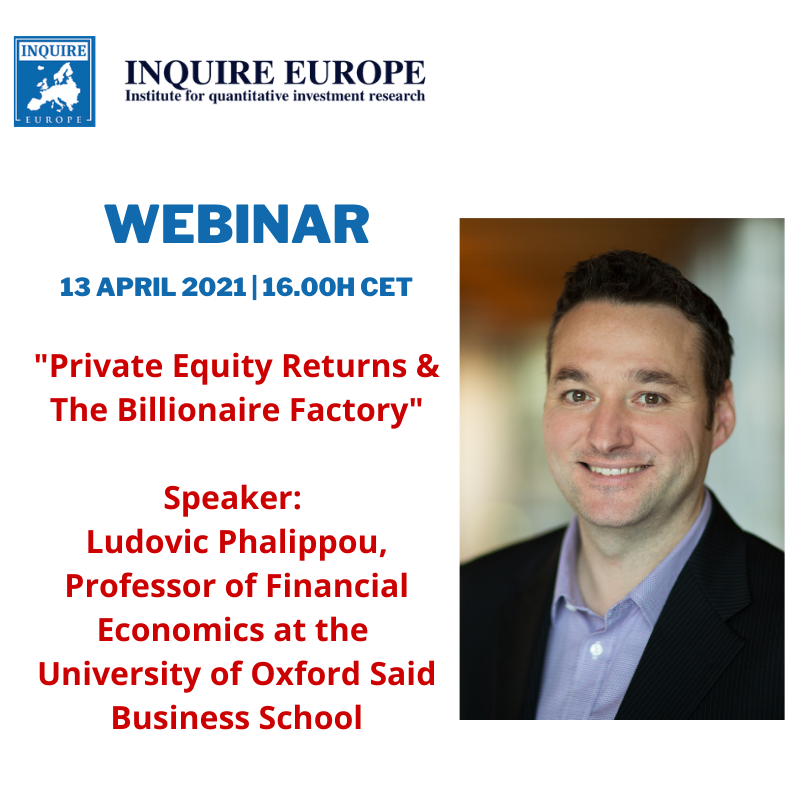Ludovic Phalippou (University of Oxford) will present his research: ‘An Inconvenient Fact: Private Equity Returns & The Billionaire Factory’.
As you know, we will not be able to convene this year for our spring seminar due to the ongoing corona crisis. However, we do remain positive that advancements are being made in Europe with vaccinations and other preventative measures and are thus hopeful that our Fall seminar will take place on location.
Per Strömberg and Ludovic Phalippou were scheduled to present during the Spring seminar in Riga (22-24 March) but will instead host separate webinars to showcase their research.
Both presentations speak to the relevance of private equity (PE) in the institutional investment landscape.
This comes on the back of a very interesting year for the asset class. According to a recently published Bain & Co. report, there was a slump in transactions due to the COVID-19 pandemic, but the largest PE managers “sprinted to the finish” in the second half of 2020. PE firms closed a total of $592 billion in deal value in 2020, up 8% from 2019 and 7% higher than the five-year average of $555 billion. The percentage of debt used in buyout transactions accelerated in 2020; nearly 80% of transactions were leveraged at more than six times earnings before interest, taxes, depreciation and amortization.
2020 was also a year in which special purpose acquisition companies (SPACs) garnered intense interest from investors. Many SPACs are sponsored by PE, and they raised more than $40 billion last year for the purpose of mergers. In 2020, 248 SPACs raised a total of $83 billion, up from a mere 19 SPACs raising less than $20 billion the year before.
13 April (16:00 CET) – Ludovic Phalippou
Ludovic will present his paper ‘An Inconvenient Fact: Private Equity Returns & The Billionaire Factory’, which has been widely circulated and commented upon. The paper (which he worked on for 15 years) shows that PE funds have returned about the same as public equity indices since at least 2006. Large public pension funds have received a net Multiple of Money (MoM) that sits within a narrow 1.51 to 1.54 range, similar to what stock markets have returned. Yet, the estimated total performance fee collected by these PE funds is estimated to be $230 billion, most of which goes to a relatively small number of individuals. This is illustrated by a striking statistic: the number of PE multibillionaires rose from 3 in 2005 to 22 in 2020.
“How could this be an economic equilibrium? […] A combination of features – misleading performance information that was presented to investors, the fees being higher than those recorded in any other investment vehicles, the high transaction costs and the many layers of potential agency conflicts – suggested the outcome was unlikely to be positive for investors[…and]some people have become extraordinarily rich. That wealth will not return to pensioners, universities, etc.”
Register for the webinar via: https://zoom.us/webinar/register/4316132996416/WN_PDR_dMijS5q3jqY82KeP5g
About the presenter
Ludovic is Professor of Financial Economics at the University of Oxford Said Business School and Head of the Finance, Accounting & Management Economics group at the University of Oxford Said Business School.
He authored the best-selling book “Private equity laid bare” and is the host of a podcast series with the same name. He has been named as one of “The 40 Most Outstanding Business School Profs Under 40 In The World” by the business education website Poets&Quants in 2014.
He specializes in the areas of private equity that are of interest to investors in that asset class, such as fee tracking, interest alignment, and return benchmarking. Ludovic has strong links with the industry, routinely speaks at practitioner conferences, and appears in the media internationally. Ludovic’s research papers have been widely cited in academia, in the press, and in regulatory circles.
He worked with a number of large institutional investors on their private equity investment decisions and benchmarking systems. At Oxford, Ludovic teaches ‘Asset Management’ and ‘Private Equity’. Ludovic achieved a degree in Economics from Toulouse School of Economics; a Master in Economics and a Master in Mathematical Finance both from the University of Southern California; and a PhD in Finance from INSEAD.

